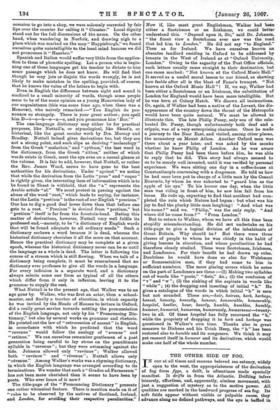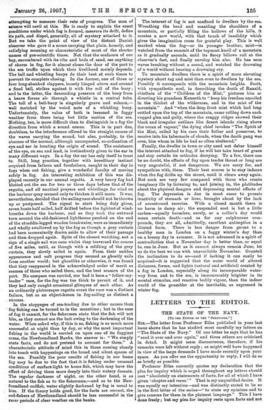THE OTHER SIDE OF FOG.
IN our at all times and seasons beloved sea estuary, widely open to the west, the appropriateness of the derivation of fog from fyge, a drift, is oftentimes made specially manifest. It drifts in from the Atlantic. Drifting infers leisurely, effortless, and, apparently, aimless movement, with just a suggestion of mystery as to the motive power. All qualities are marked in the landward progress of sea fog. Its soft folds appear without visible or palpable mute, they advance along no defined pathways, and the eye is baled in
attempting to measure their rate of progress. The man of science will cavil at this. He is ready to explain the exact conditions under which fog is formed, measure its drift, define its path, and dispel, generally, all of mystery attaohed to it. But we take the point of view of the distant Danish observer who gave it a name carrying that plain, homely, and satisfying meaning so characteristic of most of the shorter names of pre-scientific times. Not that the seafarers of our bay, encumbered with its ribs and beds of sand, see anything of charm in fog, for it almost closes the door of the port to the sea traffic upon which their livelihood mainly depends. The bell and whistling buoys do their best at such times to prevent its complete closing. In the former, one of three or four long-shanked clappers, loosely hinged above and around a fixed bell, strikes against it with the roll of the buoy ; and in the latter, the descending pressure of the buoy from a heave forces air through a whistle in a central tube. The toll of a bell-buoy is singularly grave and solemn,— well
matched by the weird note of a whistling buoy. 'Unfortunately, the value of both is lessened in foggy weather from there being but little motion of the sea. Nothing, too, is more difficult than to distinguish in a fog the direction from which a sound comes. This is in part due, doubtless, to the interference offered to the straight course of the waves carrying the sound, but also, probably, to the absence of the normal, although unsuspected, co-ordination of °eye and ear in locating the origin of sound. The assistance of the eye, on sea and land, is instinctively given to the ear in many different ways. In a fog the ear has only itself to trust to. Still, long practice, together with hereditary instinct acquired from fathers and forefathers, caught in their day in fogs when out fishing, give a wonderful faculty of moving safely in fog. An interesting exhibition of this was dis- played recently in our annual regatta. A very heavy fog had blotted out the sea for two or three days before that of the regatta, and all nautical prayers and whistlings for wind on the harbour quay seemed only to thicken it still more. It was, nevertheless, decided that the sailing race should not be thrown up or postponed. The signal to start being duly given, seven boats half sailed, half drifted before the lightest of wind. breaths down the harbour, and as they took the• outward turn around the old-fashioned lighthouse perched on the end of the straddle-legged wooden breakwater, were as immediately and wholly swallowed up by the fog as though a grey curtain bad been momentarily drawn aside to allow of their passage and then dropped again. Spite of the closest watching, not a sign of a single sail was seen whilst they traversed the course of five miles, until, as though with a relining of the grey curtain, they slowly exiled in again. From their sadden appearance and soft progress they seemed as ghostly sails from another world; but ghostlike or otherwise, it was found that they reappeared in the acknowledged order of merit as seamen of those who sailed them, and the best seamen of the port. No compass was carried, nor had it been a' follow-my- leader " race, for the fog was too thick to permit of it, and they bad only caught occasional glimpses of each other. As an ordinarily picturesque regatta event the race was a distinct failure, but as an object-lesson in fog-sailing as distinct a , success.
In the stoppages of sea-trading due to other causes than ' fog fishing can be turned to in the meantime ; but in the case of fog it cannot, for the fishermen state that the fish will not bite, as they cannot see the bait owing to the darkening of the water. When asked why, if this is so, fishing is so mach more successful at night than by day, or why the most important fishing in the world is carried on upon one of its foggiest areas, the Newfoundland Banks, the answer is: "We simply state facts, and do not pretend to account for them." A characteristic attitude of mind this in those coming closely into touch with happenings on the broad and silent spaces of the sea. Possibly the pobr results of fishing in our home fog may be due to the feet that it is fishing under unusual conditions of surface-light to home fish, which may have the effect of driving them more deeply into their watery domain. The regular darkness of night, on the other hand, is as natural to the fish as to the fisherman,—and as to the New- foundland codfish, water slightly darkened by fog is usual to Lim. If the theory holds good, for the facts are correct, the cod-fishers of Newfoundland should be less successful in the rarer periods of clear weather on the banks. The interest of fog is not confined to dwellers by the sea. Wreathing the head and mantling the shoulders of a mountain, or partially filling the hollows of the hills, it creates a new world, with that touch of insolidity which gives the imagination room for grateful play. This is well marked when the fog—or its younger brother, mist—is watched from the summit of the topmost knoll of a mountain as it gradually ascends, until its fleecy billows roll at the observer's feet, and finally envelop him also. He has seen waves breaking without a sound, and watched the drowning of a world without hearing a drowning cry.
To mountain dwellers there is a spirit of more elevating mystery about tog and mist than even to dwellers by the sea. Possibly it corresponds with the mountain heights. Scott, with sympathetic soul, in describing the death of Remold, chieftain of the "Children of the Mist," pictures him at directing his grandson Kenneth to "keep his freedom unsoiled in the thicket of the wilderness, and in the mist or the mountain." And "when the deep frost mist which bad long settled upon the top of the mountain, came rolling down each rugged glen and gaily, where the craggy ridges showed their black and irregular outlines like desert islands rising above the ocean of vapour," the dying chief invokes "The Spirit of the Mist, called by his race their father and preserver, to receive into his tabernacle of clouds, when the death pang was over, him whom in life he had so often sheltered."
Finally, the dweller in town or city need not debar himself the interest attached to fog, if he will but take heart of grace and step outside its orthodox decrying. To a few, there can be no doubt, the effects of fog upon tender throat or lung are very ungrateful, if not dangerous. We are sorry for, and sympathise with, them. Their best course is to stay indoors when the fog drifts up the street, until it clears away again. But such are very few compared with those who create imaginary ills by listening to, and joining in, the platitudes about the physical dangers and depressing mental effects of fog. The depression is due in most cases to prosaic inactivity of stomach or liver, brought about by the lack of accustomed exercise. With a closed mouth there is no harm in damp air; the suspended soot is but a little carbon—equally harmless, surely, or a collier's day would mean certain death—and as for any sulphurous com- pounds, they are all, admittedly, excellent antiseptics in a diluted form. There is less danger from germs to a healthy man in London on a foggy winter's day than on a breezy day in summer. It is not advanced in a spirit of contradiction that a November day is better than, or equal to, one in June. But as it cannot always remain June, let us do the best we can with unavoidable November. Granted the inclination to do so—and if lacking it can easily be acquired—it is suggested that the outer world of altered distances, forms, and lights (natural and artificial) created by a fog in London, especially along its incomparable water- way from and to the sea, is immeasurably brighter in its mental stimulus, and reactive bodily vigour, than the indoor world of the grumbler at the inevitable, as expressed in winter fog.























































 Previous page
Previous page